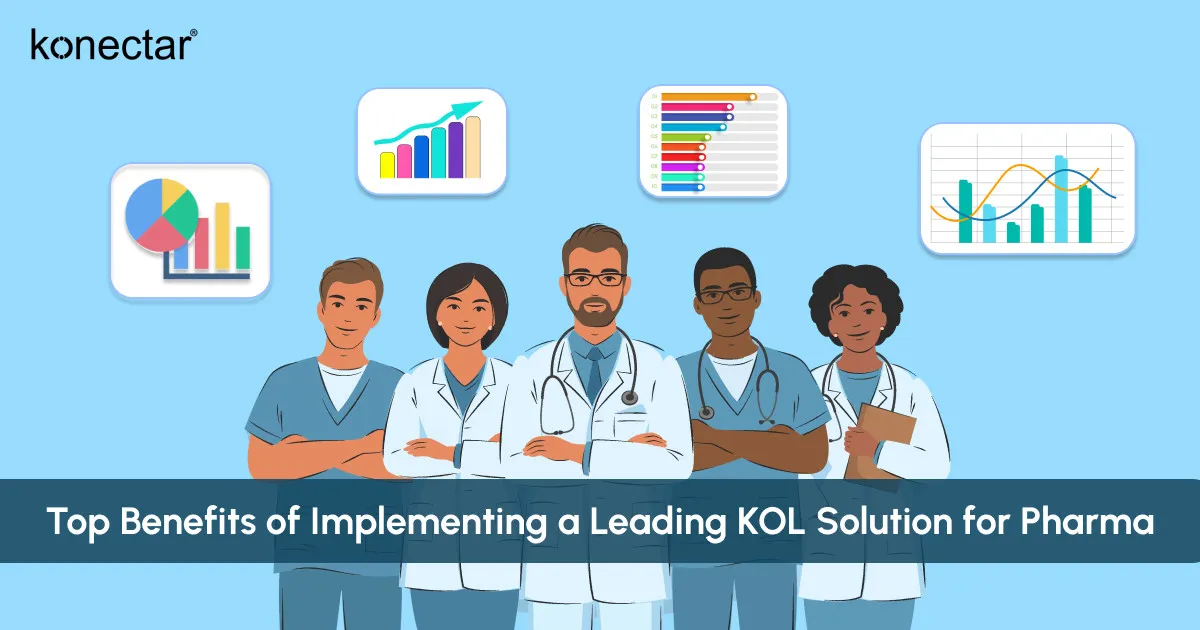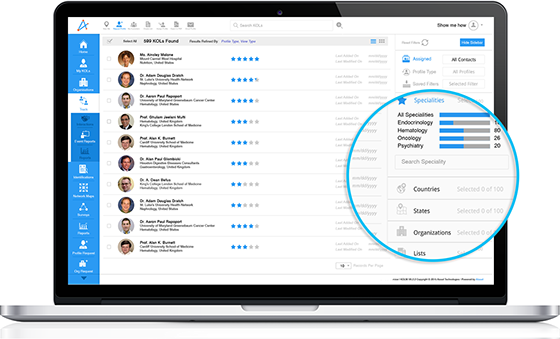08-11-2024
Top Benefits of Implementing a Leading KOL Solution for Pharma

KOL Management solutions are specialized platforms designed to help pharmaceutical companies to identify, engage, and manage relationships with Key Opinion Leaders (KOLs).
KOLs are influential leaders whose opinions significantly impact public perception. Top pharma companies in the world engage these experts to enhance their brand perception.
In this article:
Key Features of a KOL Management Solution
KOL Management platforms offer several functionalities.
Cross-Platform Integration
A KOL management platform offers integration capabilities with CRM tools to create a centralized platform where tracking all interactions with KOLs becomes possible. In addition, data from third-party sources can also be pulled in for updated information to ease the decision-making process.
Content Creation and Management Tools
With comprehensive storage and organization functionality, KOL management platform allows cross-functional teams to access past interactions to avoid redundancy and duplication of efforts.
KOLM platforms can also help generate personalized messages and content tailored to a KOL’s profile and interaction preferences.
Event Management and Tracking
Hosting webinars and live discussions is essential for pharmaceutical companies. With their importance emphasized, KOL management platform can help teams invite, manage, and track KOL participation.
Post-event engagement levels can also be accessed, such as KOL participation, attendance, and feedback that can help refine future event planning.
Enhanced Reporting and Customizable Dashboards
Dynamic dashboards are visual representations of KOL engagement initiatives. Dashboards allow teams to track KPIs to help ascertain overall campaign performance. Dashboards are also updated in real-time, allowing teams to compare the effectiveness of marketing efforts.
Benefits of Implementing a Leading KOL Solution
Enhanced KOL Identification and Profiling
KOL identification and profiling are important processes for pharmaceutical companies. KOL solutions allow pharma companies and pharma consulting teams to profile KOLs based on expertise, influence, geographical location, and engagement history.
This comprehensive profiling allows teams to pinpoint relevant KOLs that best suit their needs.
Improved Relationship Management
A KOL management platform comes replete with tools that manage communication, documentation, and social engagement. These features work towards strengthening the KOL relationship. Over time, it can help foster loyalty with KOLs that companies can leverage to their advantage.
Risk Mitigation
Compliance adherence is vital for life sciences organizations. Leading KOL solutions have in-built compliance features that send alerts in real time to help prevent any data breach before it occurs. This sort of pro-action helps minimize potential risks and ensures audit readiness.
Streamlined Collaboration Across Team
A centralized platform allows teams from marketing, medical affairs, sales, and other departments to collaborate seamlessly. Streamlined and unified collaboration efforts help establish a cohesive approach to KOL management.
Increased Operational Efficiency
By implementing a leading KOL management solution, workflows can be automated, and processes can be streamlined. This allows for reducing manual efforts, minimizing the time it takes for mundane administrative tasks. This enables the teams to focus their efforts on high-value activities, enhancing the overall efficiency of KOL management.
Competitive Advantage in the Pharma Industry
Enhanced KOL identification and profiling, improved relationship management, risk mitigation, streamlined collaboration across teams, and increased operational efficiency all together enable pharmaceutical companies to gain a competitive edge.
With established KOL relationships, organizations can build brand credibility, improve product perception, and develop effective market strategies, setting them apart from competitors.
Best Practices for Implementing KOL Management Solutions
There are some guidelines to follow while implementing a KOL management solution.
Organizational Need
Before considering implementing a KOL management solution, it is vital to conduct a thorough assessment of the organization’s specific needs and goals. Engaging major stakeholders from different departments will help accurately identify needs.
Based on this analysis, an informed decision can be made about which KOL management solution to implement.
Customization and Scalability
Organizations will have different needs, so customization becomes a near necessity to meet the unique requirements that organizations may have.
A customizable solution will function optimally, ensuring that unique needs are met completely.
Scalability is an important aspect of organizations. A scalable solution will evolve as the organization evolves in need or number.
Taken together, customization and scalability support current and future demands.
Integration with Existing System
For a KOL management solution to be effective, it should be able to integrate fully with the existing IT infrastructure.
By connecting with existing systems, cross-functional collaboration will be enhanced. Data would be shared effortlessly between departments. This integration minimizes the risk of data silos, making them available for others who may benefit from them. In addition, integration with existing systems ensures that all initiatives meet industry and legal standards.
User Training and Adoption
Maximizing the potential of KOL management software requires extensive user training. Targeted training sessions help non-technical users understand the platform’s capabilities and encourage adoption.
Training will facilitate smoother onboarding, decrease instances of errors, and empower teams to leverage the platform’s power efficiently.
Ongoing Support and Updates
Regular updates are critical to ensure the platform works according to evolving industry standards. After the initial implementation, continuous support from the vendor helps the organization address technical issues. This ensures maximum functionality.
Any challenges encountered during integration with current infrastructure, management, or user interface are resolved quickly, enhancing user experience.
Technology is constantly evolving, and regular updates ensure that the framework is in leagues with the latest industry and legal requirements.
By placing priority on continued support and updates, organizations can ensure that their KOL management platform remains a valuable asset.
Emerging Trends
New technologies are shifting how life sciences companies approach KOL management.
Cloud-based KOL Management Platforms
Cloud technology allows for seamless collaboration across geographical borders. Another advantage of cloud-based technology is that it facilitates remote work and virtual KOL engagement. A cloud-based infrastructure also ensures the global rollout of features, ensuring that teams across the globe get the same information and eliminating the need for on-site presence to work as a cohesive unit.
Remote engagement of KOLs made possible by cloud-based infrastructure is a bonus to companies looking to coordinate with KOLs outside their geographical location.
Augmented Reality (AR) and Virtual Reality (VR)
These technologies are opening up new avenues for KOL management. They offer immersive experiences for KOLs, such as virtual tours, virtual event participation, interactive product demos, virtual training sessions, etc.
The use of AR and VR in continuing medical education (CME) is also transforming traditional learning by offering interactive and immersive resources.
Role of Technology in Shaping the Future of Pharma Collaborations
With the advances in AI, cloud technology, and digital platforms, pharma companies are now better equipped to engage and collaborate with KOLs.
Machine Learning for Predictive Modeling
Machine learning models can analyze large volumes of data sets to predict drug efficacy accurately, highlight potential side effects, and assist in personalizing medicine. Advancements in genome sequencing are working towards targeted therapies with the use of machine learning.
Evidence-Based Decision Making
Real-world evidence (RWE), collected through EHRs, wearable technology, and mobile apps, allows for a deeper understanding of the efficacy of treatments in patients out in the real world. This data is essential in refining existing drugs and making data-driven decisions.
Future Outlook
KOL management solutions are moving towards a strategic role with increasing emphasis placed on data-driven insights to enhance business outcomes. Life sciences companies dedicate significant resources to engaging and maintaining KOL relationships, which is where leading KOL solutions are becoming so important.
FAQs
-
What are some of the features of a KOL management platform?
KOL management offers features such as cross-platform integration, content creation and management tools, event management, and in addition, they offer enhanced reporting through the use of dynamic dashboards.
-
What are the benefits of implementing a KOL solution?
KOL management solution offers benefits such as enhanced KOL identification and profiling, helps in relationship management, can mitigate risks, streamlines collaboration across teams, increases operational efficiency, and helps maintain a competitive edge.
-
What are some of the best practices for implementing KOL management solutions?
Some general guidelines to consider before implementing a KOL management solution are accessing organizational needs, customization and scalability, existing IT infrastructure, user training and adoption, and ongoing support and technology updates.
-
What are the emerging trends in KOL management platforms?
Some emerging trends are cloud-based technology, augmented reality (AR) and virtual reality (VR) for KOL management.
-
What is the role of technology in shaping the future of pharma collaborations?
Machine learning for predictive modeling and evidence-based decision-making is revolutionizing the future of pharma collaborations.





